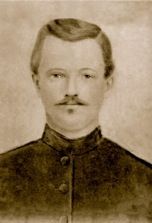At first glance, today is a typical Sunday at the Union Baptist Church in Tennessee’s Stockton Valley in Loudon County. Inside the plain meeting house with perhaps one hundred or more persons present, preaching and singing fill the morning hours as the temperature rises this hot August day. The sounds wafting through the open windows provide a backdrop as a few men loiter in shaded areas, talking among themselves.
When the service ends, picnic spreads appear on the church grounds and families eat their noon meals. Afterwards, children play and women in groups seek the comfort of shade. Yet today’s afternoon conversations among the women are more solemn than usual, for an unprecedented meeting is now taking place in the Baptist meeting house.
Within the walls of the church, thirty-four men – husbands, fathers, sons, brothers, the youngest aged sixteen – debate their individual and collective future. Tennessee has cast its lot with the Confederacy, but East Tennessee remains a stronghold for Unionists. The men gathered in the Union Baptist Church represent the Unionist sentiments of this region of the state. Planters they are not, nor abolitionists, but rather common, southern white folk – “farmers, craftsmen and mountaineers.” Having voted against secession, they are now in an awkward situation. Confederate forces are en route to their valley, determined to enforce allegiance to the Confederacy. The consciences of these Baptist men are with the United States of America and the U.S. Constitution, yet they do not have enough weapons to stand up to the approaching Confederates.
Freedom lies 200 miles northward, across the Kentucky border, where the United States is raising an army of Tennessee volunteers. Yet freedom in Kentucky means living families behind.
Initially, there is no consensus among the men. Should they stay and hope to avoid persecution, imprisonment, or even worse? Should they flee to Kentucky and join the U.S. Army? Following much give and take and spirited discussion, by late afternoon the men make a collective decision: they will leave for Kentucky the following morning.
With heavy hearts, they disperse to their homes for the night to spend a few more hours with family. When morning comes, the men regroup at another meeting house, nearby Prospect Baptist Church. Grimly, they turn their backs to their lands and families and begin the dangerous trek to the Kentucky border. The 200 miles ahead are swarming with Confederate soldiers intent on preventing Unionists from escaping across the state line. Travel via the main highways and through major towns is out of the question. The only way to hopefully avoid capture is to follow old Indian and game trails and stay away from all but the smallest of towns and settlements.
For days the men carefully thread their way through forests and across mountains, avoiding open meadows and rendezvousing at farms owned by fellow Unionists. Others join them along the way, swelling the ranks of the fleeing Tennessee common folk. Each day is never-wracking and laden with ever-present danger, as Confederate soldiers are never far away.
Finally, days later after enduring a grueling trek through the mountainous Tennessee backcountry, on August 20 some 360 men cross into Kentucky to freedom. The next day, they enroll in the 2nd Tennessee Infantry. In so doing, they join tens of thousands of other men from East Tennessee who fight for the Union, their efforts ultimately contributing to the military defeat of their own homeland.
Sources: Garry D. Nation, “Alvis Duncan Hicks in the Civil War” (link); Peggy S. Holley, “Unionists in Eastern West Tennessee, 1861-1865” (link)



